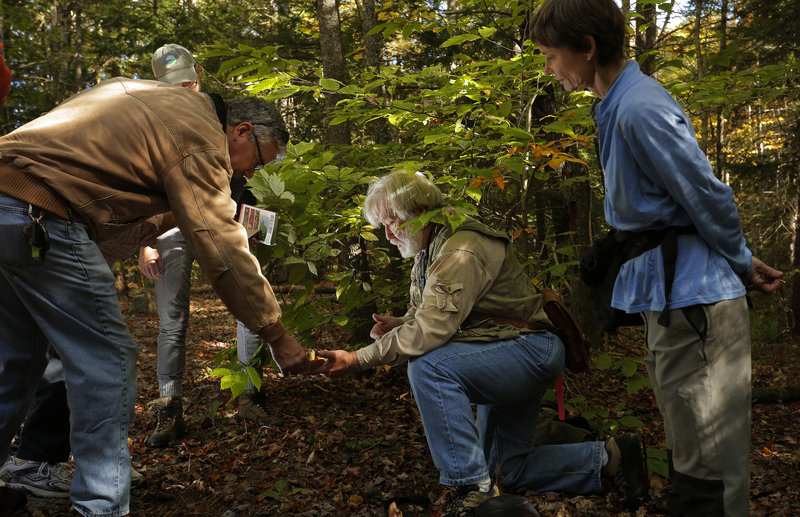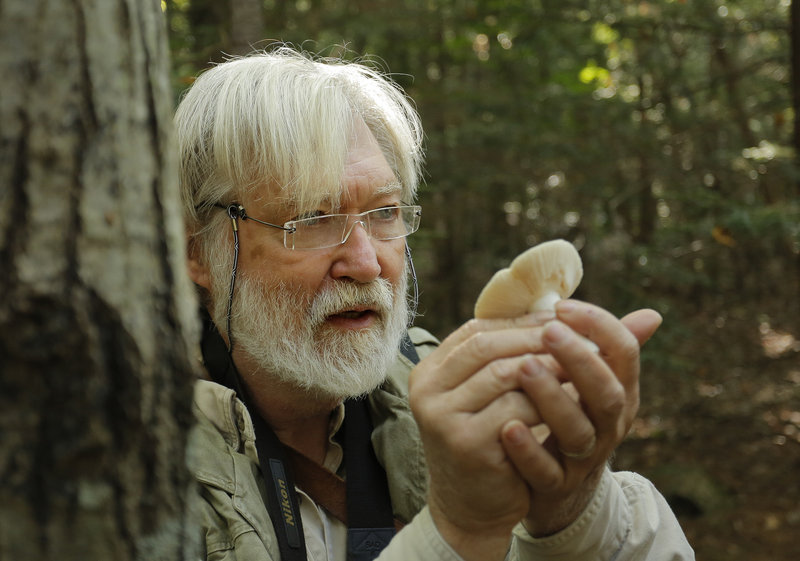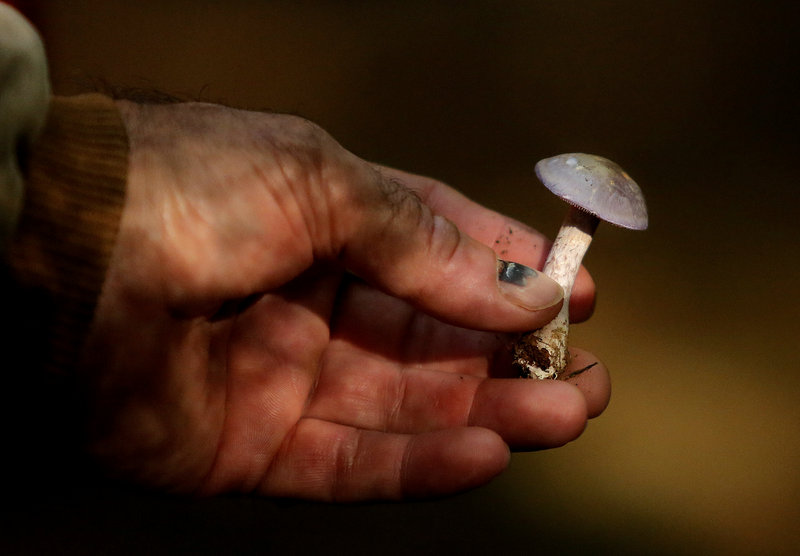BATH – The hikers who came to a talk on wild mushrooms at the Thorne Head Preserve a week ago were treated to a two-hour college-style program, a seminar that resulted from a new school for naturalists. But that school doesn’t have a campus, it doesn’t have a dedicated funding source, and it’s not part of any board of education.
It’s simply run by Maine naturalists.
So when Master Maine Naturalists Fred Cichocki and Becky Kolak finished the nature program hosted by the Kennebec Estuary Land Trust and a passing dog walker asked if they were with the state, Cichocki looked down and shook his head.
“We are not with the state. We are not with the state,” Cichocki repeated.
Founded two years ago by a group of fervent naturalists that included Cichocki, the Maine Master Naturalist Program is a rigorous educational endeavor that requires 80 hours of work, a 10-month commitment and no missed classes.
Graduates not only have to complete a 20-hour project and detailed course journal, they must show a proficiency in bird, fern, lichen, mammal and tree identification. Then they have to go out and teach 40 hours of volunteer work.
And yet the program, which costs just $300, is more about a steadfast devotion to Maine’s outdoors than having a brain bank of scientific names.
The website’s description pretty much says it all: “If you seriously wonder whether you have the time to do the course and fulfill the requirements, then you probably don’t.”
When the founders of the Maine Master Naturalist Program got together three years ago, it was with the belief that enthusiasm, love and a deep appreciation for Maine’s wild landscape would grow and spread, if only harnessed. So they set about trying to do just that.
Cichocki, an adjunct professor at the University of Maine-Augusta; writer and field guide author Dorcas Miller; Stanton Bird Club educator Susan Hayward; and Cloe Chunn, the Belfast Bay Watershed Coalition president, set about creating a rigorous but inspiring program. With seed money from the Davis Conservation Foundation, the Maine Master Naturalist Program was outfitted with basic classroom and field material. The Chewonki Foundation donated classroom space for the first year, and the founders served as volunteer faculty.
In the two years the program has been running, other volunteer teachers have joined on, as many as 30, and the number of graduates has climbed.
Miller said that during the first year, 56 graduated and went on to do 650 hours of volunteer work at five land trusts, five elementary schools and countless outdoor venues.
“All the instructors volunteer. If I’m willing to volunteer to teach, the idea is the students will volunteer,” Miller said. “A few of the graduates have not followed through on their volunteer work. Life happens. But a huge majority have done their required work, and many have gone well beyond.”
As the education coordinator for the Kennebec Estuary Land Trust, Kolak uses her Master Maine Naturalist certification in her day job, but she volunteers elsewhere as well, at land trusts in Cape Elizabeth and Wells.
“That kind of excites me to work with new people and groups outside the Kennebec estuary. And I really like working with kids, getting them amped on nature,” Kolak said.
Two weeks ago near the Kennebec River in Bath, Cichocki, a retired college science professor, helped Kolak lead a study of mushrooms. It’s not a subject covered in the course, but this day it’s an excuse to show how field guides can be used to study the woods more closely.
As participants found mushrooms in shades of yellow, purple, red and brown, Cichocki talked about slugs that feast on mushrooms, and how they are exotic in Maine. He talked about the symbiotic relationship between fungi and plants. And he touched on how some fungi have been used as anti-cancer remedies while others can be used as tinder.
He and Kolak demonstrated how the boletus badius mushroom “bruises” and leaves dark green marks when touched, changing color instantly.
“It’s the original mood ring,” Cichocki quipped.
In the end, the mushroom exploration was more a lesson in how to identify fauna and study it. And that opened the door to a world of discussion about Maine’s woodlands.
“It started at a meeting in my kitchen in Chelsea. And now we have a program, and an amazing array of dedicated volunteers, all of whom have vastly different talents,” Miller said.
“This is exactly what I wanted. I don’t see us growing in terms of structure. But in 10 years, there will be 400 people out there teaching, and each of them teaching 40 hours a year. You do the math.”
Deirdre Fleming can be contacted at 791-6452 or at:
dfleming@pressherald.com
Twitter: Flemingpph
Send questions/comments to the editors.






Success. Please wait for the page to reload. If the page does not reload within 5 seconds, please refresh the page.
Enter your email and password to access comments.
Hi, to comment on stories you must . This profile is in addition to your subscription and website login.
Already have a commenting profile? .
Invalid username/password.
Please check your email to confirm and complete your registration.
Only subscribers are eligible to post comments. Please subscribe or login first for digital access. Here’s why.
Use the form below to reset your password. When you've submitted your account email, we will send an email with a reset code.